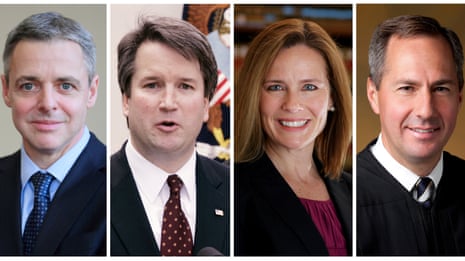Battle lines have been drawn over the future of abortion in America on the eve of President Donald Trump’s nomination of a second justice to the US supreme court that could put the landmark 1973 ruling Roe v Wade in jeopardy.
Both sides in the increasingly acrimonious dispute took to the Sunday political talkshows at the start of what promises to be an epic tussle over the ninth seat on the nation’s highest court. The position will be left vacant by the retirement of Justice Anthony Kennedy, 81, who had acted as the swing vote on many critical issues including abortion.
Trump has said he will announce his nominee for the seat in a characteristic display of political braggadocio on primetime TV at 9pm ET on Monday night. On Sunday there was no indication that he had yet made his decision, as speculation continued to swirl around the shortlist for the appointment.
“We are close to making a decision,” Trump said on Sunday. “It’s, well, let’s just say it’s the four people. Every one you can’t go wrong. I’ll be deciding tonight or tomorrow sometime by 12 o’clock.”
In the course of the 2016 election, Trump made changing the face of the US supreme court a key campaign pledge that was instrumental in firing up his base of rightwing conservative voters. In the presidential debates he vowed to appoint only justices committed to “automatically” overturning Roe v Wade, the precedent that established a constitutional right to an abortion under certain circumstances.
Now key players in the appointment are reining back on the suggestion that the newly composed court will target the pro-choice ruling and re-criminalise the practice. Leonard Leo, the vice-president of the conservative Federalist Society who selected Trump’s longlist of 25 candidates for the supreme court, told ABC’s This Week that warnings about Roe v Wade were a “scare tactic”.
Leo said that it was impossible to predict the positions of any of the leading candidates for the seat on abortion. “Nobody really knows,” he said. “We’ve been talking about this for 36 years going all the way back to the nomination of Sandra O’Connor, and after that you only have a single individual on the court who has expressly said he would overturn Roe.”
Leading Republican US senators also toured Sunday TV studios predicting that their party would stand united over the confirmation process, and warning Democratic senators from conservative “red” states won by Trump in 2016 that if they opposed the nomination they would have to answer to voters at the midterm elections in November.
“This is a nightmare for red state Democrats to oppose a highly qualified nominee – and all these candidates are highly qualified,” Lindsey Graham, the senator from South Carolina, told Fox News Sunday.
Trump is known to have interviewed at least seven candidates for the post, all drawn from the Federalist Society longlist. Of those, the shortlist is understood to have boiled down to four judges from various US courts of appeal – Amy Coney Barrett, Thomas Hardiman, Brett Kavanaugh and Raymond Kethledge.
Of those, Barrett is considered to have the most hardline record opposing abortion rights, but that could cause problems among more moderate Republicans in the Senate, notably Susan Collins from Maine who is already the target of adverts being put out by pro-choice groups.
The New York Times on Sunday reported that the Senate majority leader, Mitch McConnell, was strongly urging Trump to opt for either Hardiman or Kethledge on grounds that the other two might be impossible to get confirmed. While Barrett is problematic on the abortion issue, Kavanaugh is unpopular among some Republican senators because of his track record as staff secretary under President George W Bush.
Trump’s Monday night nomination will be his second since he entered the White House. Just days after his inauguration in January 2017 he nominated the conservative justice Neil Gorsuch to the court.
Democrats and pro-choice groups stepped up their rhetoric on Sunday over the danger of Trump’s second pick. Richard Blumenthal, Democratic senator from Connecticut, told ABC’s This Week that it posed a fundamental threat to abortion rights.
“This next nomination will be the swing vote to overturn Roe v Wade and equally important to eviscerate the protections of millions of Americans who suffer from existing conditions and other healthcare rights along with workers’ rights, gay rights, voting rights.”
Blumenthal accused Trump of turning himself into a “puppet of outside groups” by choosing his nominee from “a group of rightwing fringe ideologues that have prepared this list.” He namechecked Leo’s Federalist Society and the rightwing Heritage Foundation.
Ilyse Hogue, president of the pro-choice organization Naral, told Fox News Sunday that Trump had changed the rules of the game. “He has put a litmus test on the supreme court nominee” over abortion, she said.
In return, Hogue said, senators should demand of the nominee in the course of the confirmation process that they give an affirmative declaration that they would uphold Roe v Wade. She pointed to the confirmation process of Justice Ruth Bader Ginsburg in 1993 in which she said that all women should be afforded the right to privacy to make their own decision.
Ginsburg was confirmed by the Senate by a whopping 96 votes to 3.
